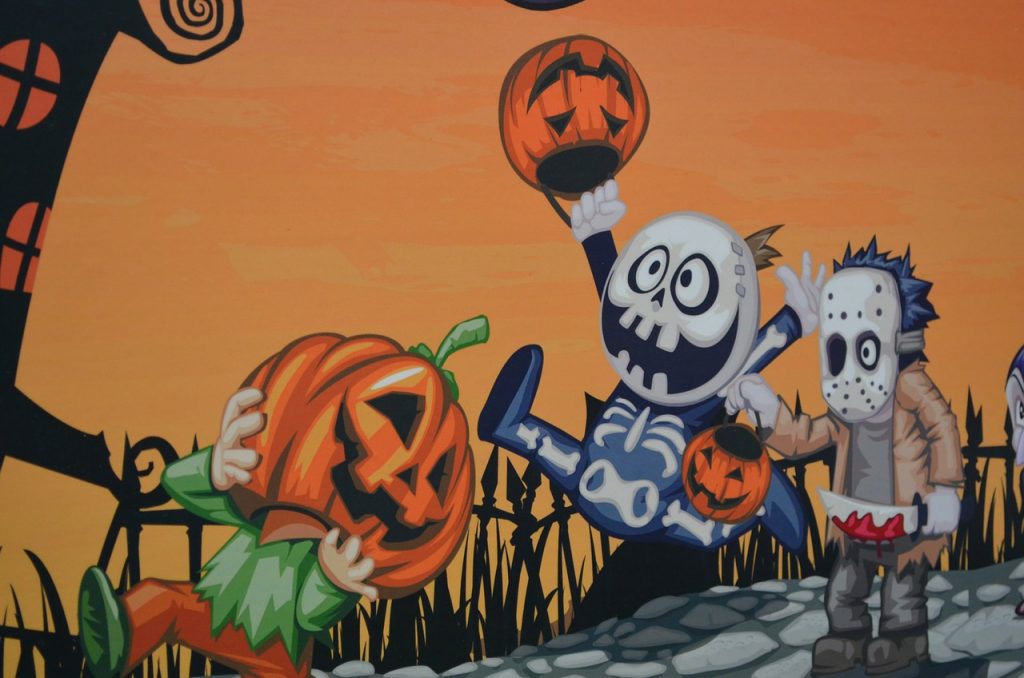Trick or Treat! Posted by Gary Locke on Oct 24, 2019 in Culture, English Grammar
When I was a kid, Halloween was always an exercise in greed. I was far less interested in my costume than in the loot I was going to acquire while wearing the costume. I planned my evening very carefully, mindful to take advantage of the time my parents had permitted me. I wouldn’t allow my father, or anyone else, to drive me because I didn’t want to miss any lighted porch or doorway. My route took me across several miles of sidewalks. I carried an enormous, hollowed-out plastic jack-o’-lantern1https://en.wikipedia.org/wiki/Jack-o%27-lantern, complete with a green handle. By the end of my adventure, that container was very heavy. All because I fearlessly knocked on doors or pressed doorbells and said three magic words – “Trick or treat!”
The Origins of Trick or Treat
History records numerous Christian and pagan traditions associated with late October and early November in the English-speaking world. They began with the Celtic festival of Samhain across Ireland and Britain. Samhain marked the end of the year when harvests were finally complete. The boundary between the living and the dead connected during this festival. On the night of October 31, the dead walked the earth in search of food from their descendants. Mazes in cornfields were constructed to confuse the wandering spirits. Bonfires were lit to keep them away. Many wore masks and disguises so that they would not be recognized by the spirits. Finally, as the night turned into the Day of November 1, the embers of the bonfires would be used to light the hearths for the coming winter.
In the 7th century, November 1st became the Christian holiday of All Saints Day to honor all who have entered heaven, including all saints past, present, and future, in an effort to supplant all the pagan rituals surrounding the date. This move was only partially successful. October 31st became All Hallows Eve. Hallow, from the Old English halig, or holy and from Middle English Alholowmesse. Eventually, this term morphed into Halloween.
Trick or treating comes to us from the practice of souling – going from door to door on November 2nd, All Souls Day, to solicit gifts of food in return for prayers for the dead. This tradition can still be found in Catholic Ireland, where soul-cakes are baked for ancestors and recently departed loved ones.
A Penny for the Guy
Curiously adding to the pagan and Catholic traditions around this time of year is the fate of Guy Fawkes, who plotted to bomb Parliament during the Gunpowder Plot of 1605. Fawkes was scheduled to be hanged, drawn and quartered on the 5th of November, but instead, he jumped from the scaffold with the noose around his neck. In remembrance of that event, effigies of Fawkes are burned on that night, as children go door to door in search of “a penny for the Guy.” That is, they want money for fireworks. The tradition is grisly, but very much connected with similar traditions associated with souling.
In Scotland, children took to guising, dressing up in costume and performing some kind of trick or stunt for a small present. The tradition dates back to shortly after the Gunpowder Plot, and is a very distinctive precursor to our tradition of Trick or Treat, which finally found wide acceptance in the US by the years just following World War 2. The country had to wait until after the sugar rationing of the war years. Now, at last, candy was available to everyone.
Smell My Feet Or Give Me Something Good to Eat!
But, why do we yell, “Trick or treat!”? Well, remember that I was walking for miles in the darkened streets of my neighborhood in a wide circle. And I wasn’t alone. Scores of other children were doing the same thing. And if we didn’t get any candy (or similar treat), we might pull a prank or two in retaliation. Now, I’m not saying that I tossed rolls of toilet paper in trees or across lawns. And I’m not saying that I ever took a can of shaving cream to a car parked in the driveway of a house with no lights on at 7 PM. But, I am saying that such things were known to have happened.
- 1https://en.wikipedia.org/wiki/Jack-o%27-lantern

Build vocabulary, practice pronunciation, and more with Transparent Language Online. Available anytime, anywhere, on any device.




